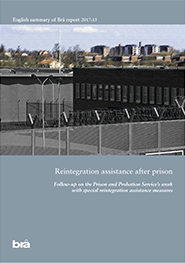- Start
- / Home
- / Publications

Reintegration assistance after prison
Follow-up on the Prison and Probation Service’s work
with special reintegration assistance measures. English version of report 2017:17.
Within three years of release from prison, two out of five persons commit a new offence sanctionable by prison or probation. The National Council for Crime Prevention (Brå) has studied the Prison and Probation Service’s work with special reintegration assistance measures in Sweden.
This is a summary of the original Swedish Brå report 2017:17
Well-functioning reintegration assistance entails that the substance of the various forms of reintegration assistance correspond to the intended purpose and that the clients who need some form of reintegration assistance satisfy the prerequisites necessary to utilise it. In respect of the substance of the measures, Brå’s assessment is that they prepare the clients, in various ways, for a return to the community. According to several of the studies, one of the measures – enhanced day release – also leads to a reduction of the percentage of recidivists. Although no significant effect has been observed for other measures, it is not unreasonable that these measures could be structured to have effect which prevents recidivism. However, this requires a concerted effort to match each individual client with a measure that meets their needs.
In respect of the number of clients who receive reintegration assistance, there is much to indicate that more individuals could be given access to reintegration assistance. Many of the previously identified impediments to increasing the number of persons who have access to reintegration assistance remain. These primarily involve overestimating the clients’ risks, insufficient planning of measures, and insufficient interest among the clients.
The Prison and Probation Service’s development work can lead to more individuals obtaining access to reintegration assistance and improvement of the effect of the measures. However, the Prison and Probation Service has carried out similar projects with no improvement. Accordingly, it is important to follow up on and evaluate the work.
In Brå’s opinion, the Prison and Probation Service’s reintegration assistance work is knowledge-based insofar that extensive follow-up statistics are maintained. However, Brå believes that additional follow-ups and analyses which would be valuable in terms of developing the scheme. This includes, for example, studies which would illuminate the following issues:
- What is causing the absence of effects from treatment periods?
- What would be the consequences if individuals at a higher risk level were granted reintegration assistance to greater extent?
- What are the possibilities for allowing a greater number of clients with limited or no Swedish language skills to participate in reintegration assistance?
- What are the consequences of the Ny VSP on reintegration assistance work?
- Notwithstanding substantial development work, Brå believes that there is a relatively large group of inmates who, for reasons related to time, will not come into question in respect of reintegration assistance. The Prison and Probation Service should be able to investigate whether these
clients could, under controlled forms, be given access to computers, telephones, and the internet within the prison in order to prepare them for release.
© The Swedish National Council for Crime Prevention, 2018
Authors: Stina Holmberg, Johanna Kindgren and Linnea Littmann
urn:nbn:se:bra-739

